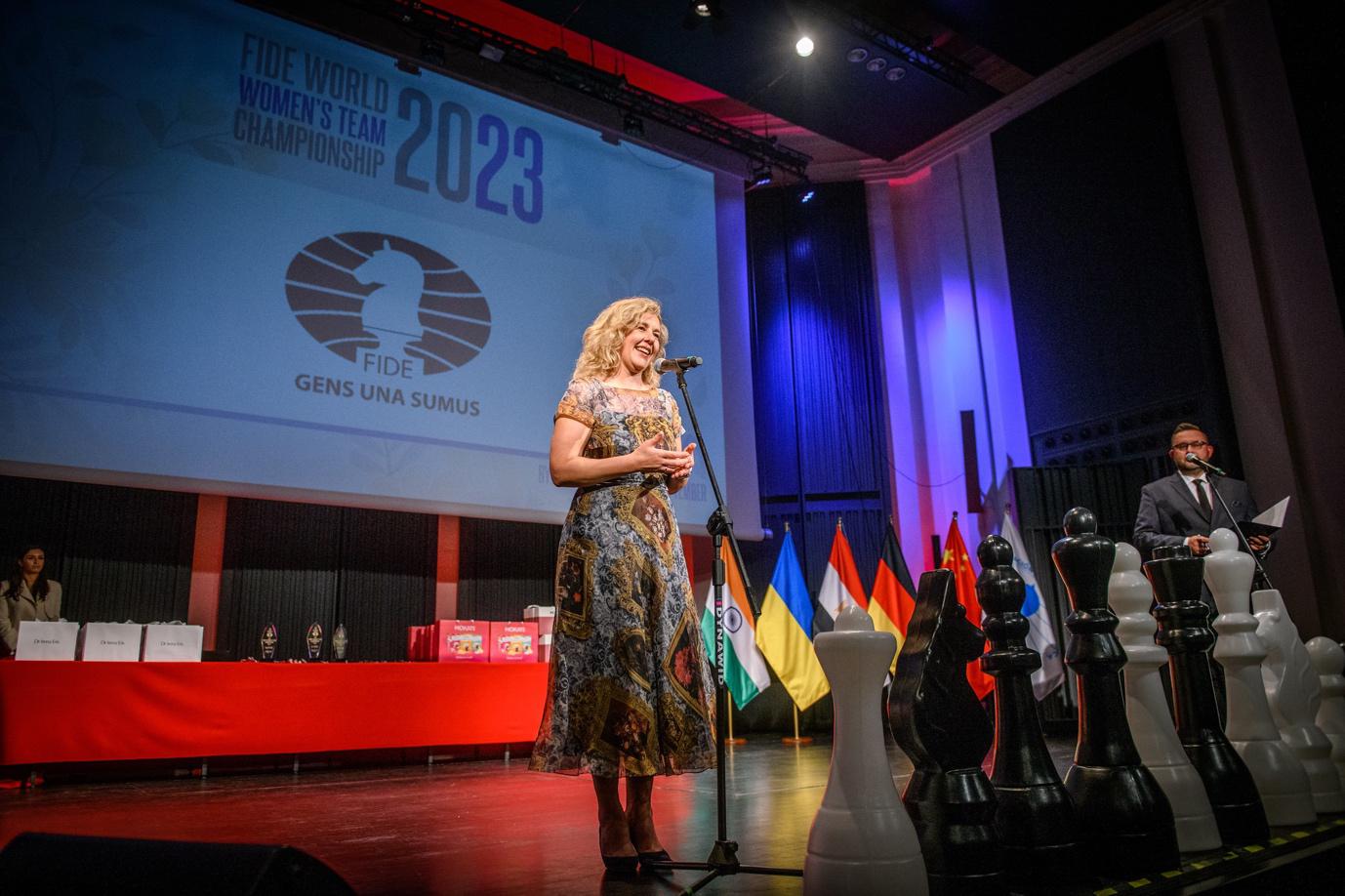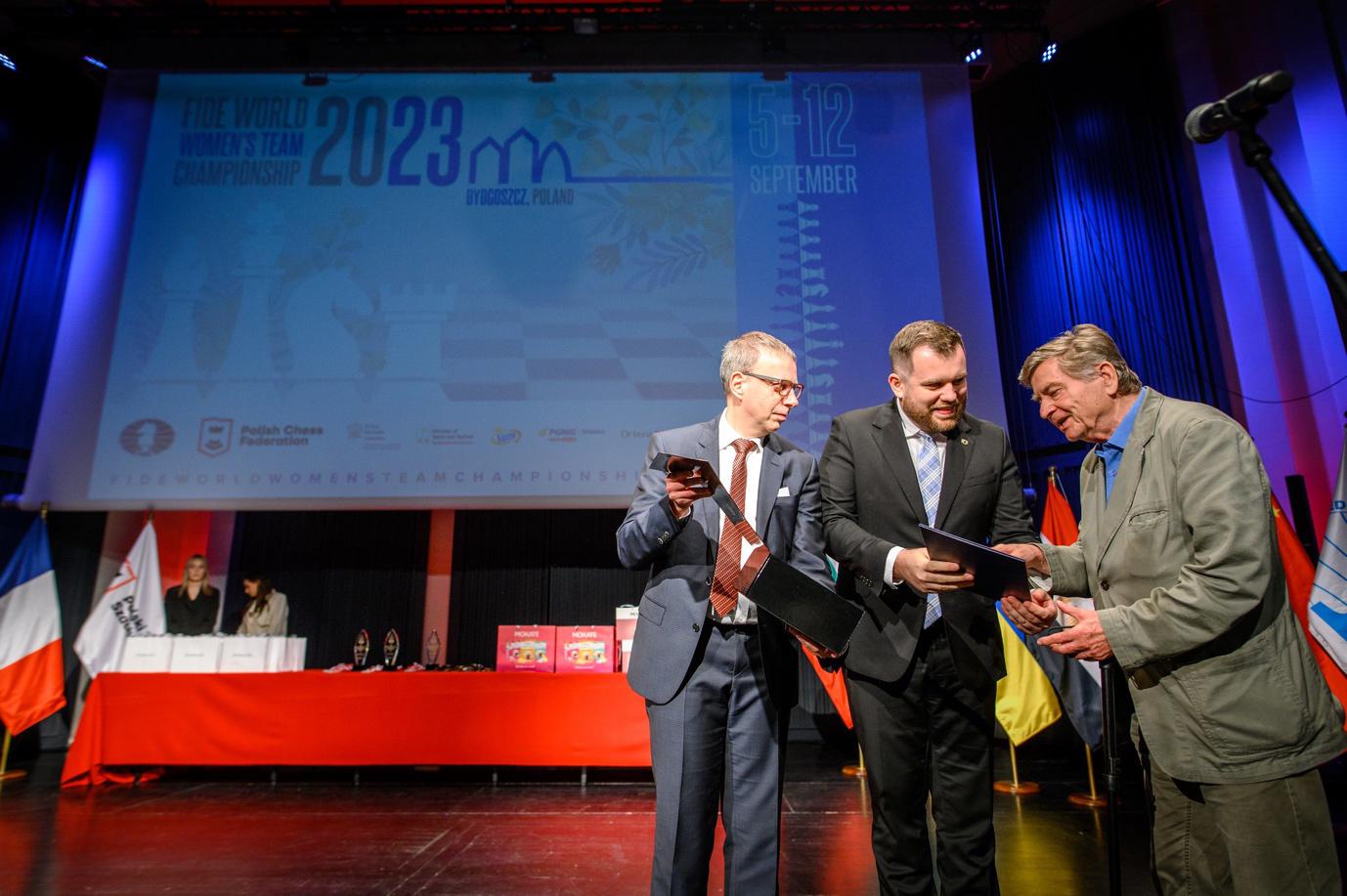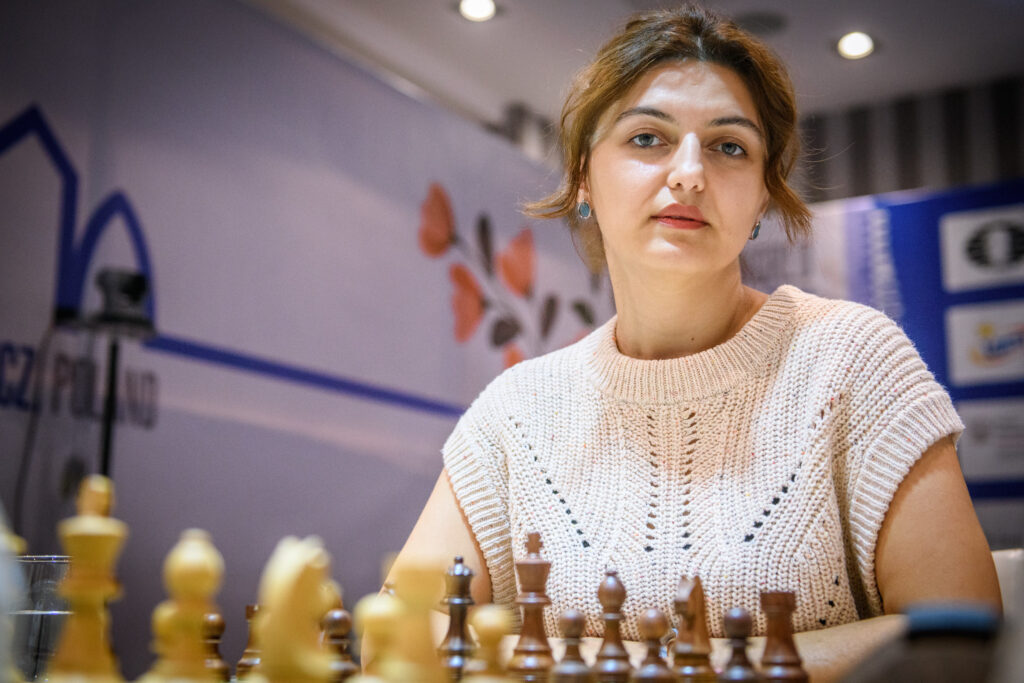Kazakhstan gets the silver medal, and the bronze goes to France
The experience of the Georgian players prevailed over the youth and talent of the Kazakhstani team, which, with an average age of 18 years old, performed above all expectations and will bring home a praiseworthy Silver medal.
It’s not the first time that Georgia wins this championship: in 2015, under a different format but with an identical lineup, Bella Khotenashvili, Meri Arabidze, Nino Batsiashvili, Lela Javakhishvili, and Salome Melia secured the trophy for their country in Sochi, 2015.
In the Small Final, the clash between France and the USA was a very close affair, but in the end, it was “les Bleues” who got the Bronze medal, after a draw in the first match and a 3-1 victory in the second match.
Georgia – Kazakhstan (2½-1½) (3½-½)
The first match between Georgia and Kazakhstan set the tone for the Final, with Lela Javakhishvili turning into the hero of the day, as she won both games in great fashion. Playing on the White side of a King’s Indian against Amina Kairbekova, she got an advantage right out of the opening that she soon converted into an extra pawn. At some point, her rival managed to equalise, but shortly after she made a mistake that allowed Lela to be in command again.

With things looking so good on the fourth board from so early, all the Georgians played free of pressure. Nurmanova tried a new move in the Ruy Lopez, 11.Nxe5, against Batsiashvili, but the resulting position was completely equal and ended in a draw. The same result was reached in the second board, Arabidze-Kamalidenova, where the young Kazakhstani took risks from the opening, sacrificing a pawn for activity. Even though she got enough compensation, she never achieved an advantage.
The game between Assaubayeva (with White) and Khotenashvili was a Queen’s Gambit Declined (Exchange variation), where as early as move nine we had a completely new position on the board. With no real chances to win the game, Bibisara settled for a draw with a perpetual check. When Javakhishvili finally converted her advantage, the match was over: 2½-1½.
The second match was not meant to change the fate of the final, and Georgia won again, even by a higher score. On the third board, Nino Batsiashvili and Alua Nurmanova saw an early queen exchange, which soon led to a draw increasing the pressure on the Kazakhstani players.
The key was was the one on the first board between Bella Khotenashvili and Bibisara Assaubayeva. Both players followed an unorthodox plan in the King’s Indian, and White had a small edge out of the opening. Under pressure, Bibisara blundered a piece when her position was already hopeless.
Lela Javakhishvili was better with Black, after her opponent played the opening carelessly, but after checking the match situation after 90 minutes of play, she decided to go for a line that would guarantee her a draw. Perfectly aware that this result was not enough, her opponent tried to force matters and keep the game going, only to lose.
The second-board clash between Kamalidenova and Arabidze was very balanced, but towards the end, Meruert lost the thread of the game and her position collapsed, leaving the final score in a double victory for the Georgians, by 2½-1½ and 3½-½.
France – USA (2-2) (3-1)
The first match for the Bronze was quite a slaughter fest, with 6 out of the 8 games reaching a decisive result, many of them after several unexpected turns.

On the fourth board, two former teammates found themselves facing each other representing their countries of adoption. Mitra Hejazipour, with White, and playing now for France, chose the wrong plan with 23.f4 and 24.Rf3, giving up a pawn for the attack. Pourkashiyan, playing for the USA, demonstrated that Black had nothing to fear, and grabbed the full point.
Anastasia Savina had an inferior position with White, but Tatev went wrong, allowing the White Queen to penetrate the Black King’s position, and resigning shortly after.
Alice Lee went wrong with 19.Qa5 and allowed Deimante to grasp the initiative, and to make things worse, she then blundered a pawn with 22.Rc3, missing a simple tactic. However, things went horribly wrong for Deimante from then on. She gave up an exchange, unnecessarily, to capture one of White’s pawns, and then she got her pieces entangled in the first rank, losing material, and the game.
Meantime, Sophie Milliet played a brilliant attacking game, with Black, with an exchange sacrifice included. With her victory, the first match ended in a 2-2.
For the second match, the Americans replaced Tatev with Zatonskih, while Hejazipour gave her place to Natacha Benmesbah.
France’s second board, Anastasia Savina, got out of the opening with a better position against Zatonskih, but the game ended in a draw. Atousa Pourkashiyan went for a false combination, probably missing something important in her calculation. She lost almost on the spot, giving the full point to Natasha.
Sophie Milliet, on the White side of a Richter-Rauzer Sicilian, saw her attack progressing much faster than her opponent’s, and scored another brilliant victory, the second of the day for her, becoming the star of the French team.
On the first board, the clash between Daulyte-Cornette and Lee was “unbalanced but roughly equal”, and ended in a draw after 60 moves, when the match had already been decided on the two lower boards. A fantastic performance by the French team, which brought them a historical and well-deserved Bronze medal.
The individual medals, decided by tournament performance, were awarded as follows:
First board:
Alice Lee (USA) – Gold
Deimantė Daulytė-Cornette (FRA) – Silver
Bibisara Assaubayeva (KAZ) – Bronze
Second board:
Meri Arabidze (GEO) – Gold
Yang Shen (CHI) – Silver
Anastasia Savina (FRA) – Bronze
Third board:
Nino Batsiashvili (GEO) – Gold
Tatev Abrahamyan (USA) – Silver
Sophie Milliet (FRA) – Bronze
Fourth board:
Qi Guo (CHN) – Gold
Lela Javakhishvili (GEO) – Silver
Alua Nurmanova (KAZ) – Bronze
The closing ceremony took place shortly after the conclusion of the games, in the nearby Music Academy of Bydgoszcz, also known since 1981 as the “Feliks Nowowiejski Music Academy”. Among the attendants, besides the players, there were the President of the Polish Chess Federation Radosław Jedynak, FIDE’s Managing Director Dana Reizniece-Ozola, FIDE Vice President Olalekan Adeyemi, the FIDE Technical Delegate and European Chess Union Vice President Gunnar Bjornsson, the FIDE Secretary General Łukasz Turlej, the tournament director Maciej Cybulski, the Chief Arbiter -andformer president of the Polish Chess Federation- Tomasz Delega, and Anastasia Sorokina, Chair of FIDE Women Commission. The two finalists were also escorted by Akaki Iashvili, President of the Georgian Chess Federation but also Chairman of FIDE events Commission, and Bekzat Sabituly, Consul at the Kazakh Embassy in Poland. Dra. Irena Eris and Mr. Henryk Orfinger, founders of Dr. Irena Eris cosmetics company, and a highly regarded partner of the Polish Chess Federation and the event, were also in attendance.

During her speech on behalf of FIDE, Dana Reizniece-Ozola thanked the Polish Prime Minister and local authorities for their support and commitment in making this event possible. She also emphasized the fair play demonstrated by the players with their fighting spirit and respect for the game and their opponents.
“What is the secret of the Georgian women chess players’ strength?”, she wondered. “They say it lies in the fact that historically, a chess set was given as a part of a dowry to every Georgian woman who was getting married. I would still bet on the fact that they work a lot – the same as all other top chess players who spend hours and hours studying chess every day. My warm congratulations go to Team Georgia for the gold, but huge respect and appreciation also to Team Kazakhstan for the silver medal, Team France for the bronce, and all the others for the tremendous fighting spirit”, she added.

During the closing ceremony, FIDE and the organising team also paid tribute to IA Ulrich Jahr. Born in Bydgoszcz 84 years ago, Ulrich is a highly respected figure in Polish chess, having organised and refereed multiple events through the decades. In recognition of his services, he was awarded the Silver Cross (1983) and the Gold Cross of Merit (1997). Since 1997, he has also been an honorary member of the Polish Chess Federation. This year, Mr. Jahr was also one of the recipients of a grant by FIDE as part of its Veterans Support Program.

